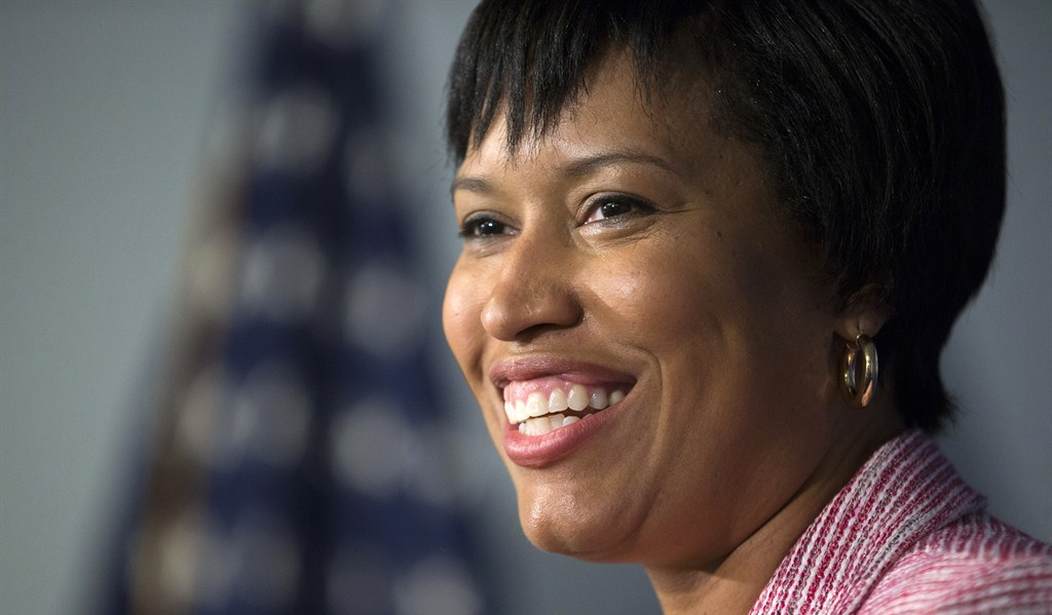The District of Columbia Council and Mayor Muriel Bowser have launched a two-front war against the First Amendment rights of Catholic schools and other religious and pro-life institutions in Washington, D.C.
The question now: Will House Speaker John Boehner and Senate Majority Leader Mitch McConnell use the authority the Constitution gives Congress over D.C. and expenditures from the Treasury to protect religious liberty in the nation's capital itself?
This is a defining issue for this Congress.
In January, Bowser signed two pieces of D.C. legislation -- the Reproductive Health Non-Discrimination Amendment Act and the Human Rights Amendment Act.
The U.S. Conference of Catholic Bishops explained the practical impact of these new D.C. laws -- and why the bishops opposed them -- in a letter sent March 20 to members of Congress.
"The Reproductive Health Non-Discrimination Amendment Act prevents religious institutions, faith-based organizations, and pro-life advocacy organizations from making employment decisions consistent with their sincerely held beliefs," said the letter signed by, among others, Cardinal Donald Wuerl of Washington, D.C., Cardinal Sean O'Malley of Boston and Archbishop William Lori of Baltimore.
"For example," said the bishops, "they could be forced to hire, retain and promote individuals whose public speech and conduct contradicts their missions."
"The Human Rights Amendment Act repeals the Nation's Capital Religious Liberty and Academic Freedom Act (also known as the 'Armstrong Amendment' after Senator William Armstrong) passed by Congress in 1989 and made part of the District of Columbia code," the bishops told Congress.
Recommended
"Importantly, the Armstrong Amendment ensures that the D.C. Human Rights Act cannot be construed to require religiously affiliated schools to officially endorse, fund, or provide other assistance for the promotion of human sexuality or sexual conduct contrary to the schools' faith and moral beliefs," they said.
"In effect," the bishops said, "both RHNDA and HRAA would compel religious institutions, faith-based organizations, and pro-life advocacy organizations to engage in certain behavior that seems intended to drive these institutions and organizations out of the District of Columbia."
HRAA, if it stays in effect, could be used to force a Catholic high school to provide facilities on campus for a "student" group that advocates homosexual behavior. RHNDA could be used to force a Catholic school to maintain on its faculty a teacher who tried to persuade students that it is a good thing to kill an unborn child.
The bishops asked Congress "to rescind RHNDA and HRAA."
The Constitution gives Congress the power to "exercise exclusive Legislation in all Cases whatsoever" over D.C. It also says: "No Money shall be drawn from the Treasury, but in Consequence of Appropriations made by Law."
Under the 1973 D.C. Home Rule Act, Congress can disapprove any legislation enacted by the D.C. Council by passing a resolution disapproving that legislation within 30 legislative days of when the mayor officially transmits it to Congress. The president must sign that resolution.
Mayor Bowser transmitted HRAA and RHNDAA to Congress March 6. Congress had until Monday to disapprove them.
On March 18, before the bishops sent their letter to Congress, Sen. Ted Cruz, R.-Texas, -- joined by Sen. James Lankford, R.-Okla., -- introduced two Senate resolutions disapproving HRAA and RHNDAA.
On April 13, Rep. Diane Black, R.-Tenn., -- joined by Rep. Mark Meadows, R.-N.C., and Rep. Bill Flores, R.-Texas, -- introduced a House resolution disapproving RHNDAA.
On April 14, Rep. Vicky Hartzler, R.-Mo., -- also joined by Meadows and Flores -- introduced a resolution disapproving HRAA.
In the Senate, the Homeland Security and Governmental Affairs Committee had jurisdiction over the resolutions. Chairman Ron Johnson, R.-Wis., did not advance them.
In the House, the Oversight and Government Reform Committee had jurisdiction. Chairman Jason Chaffetz did nothing with the resolution to disapprove HRAA. But he did put the RHNDAA disapproval through the committee.
Last Thursday, in the face of a veto threat from the White House, the House took up this resolution at the last possible moment. It passed 228 to 192. Three Democrats voted for the disapproval -- and, thus, for liberty. Thirteen Republicans voted against it.
The Senate took no votes on the resolutions.
Given the unlikelihood President Obama would sign stand-alone bills protecting the freedom of conscience of Catholic schools and other religious and pro-life institutions in D.C., Representatives Black and Flores led a group of 67 House members in sending a letter to Rep. Ander Crenshaw, R.-Fla., who chairs the House Appropriations Subcommittee with oversight over funding for D.C.
They asked that his committee "ensure that any Fiscal Year 2016 appropriations measure contains language that would prohibit funds to implement or carry out any rule or regulation associated with RHNDAA or HRAA."
"It is our belief that Congress must wield its constitutional 'power of the purse' to prevent infringement of the fundamental constitutional protection for District-based employers and institutions," they said.
HRAA and RHNDAA are now D.C. law.
On Tuesday, I asked spokesmen for Governmental Affairs Chairman Johnson, Senate Majority Leader McConnell, R.-Ky., and House Speaker Boehner, R.-Ohio, if those congressional leaders supported including language to defund RHNDAA and HRAA in whatever bill ultimately appropriates federal funds for D.C. in fiscal 2016.
Johnson's communications director Melinda Schnell said Johnson did.
"Senator Johnson opposes the actions taken by the District of Columbia and absolutely supports defunding the two D.C. laws through appropriations," said Schnell. "Senator Johnson worked closely with the sponsors of the disapproval resolutions and determined that the only way to successfully reverse D.C.'s unconstitutional actions is through appropriations."
McConnell's Deputy Chief of Staff Don Stewart responded that McConnell "believes that the committees should develop legislation rather than writing it here. The committees will draft the legislation."
"We haven't made any announcements on what the committee will do," he said.
"The speaker would defer to the subcommittee chairman on his bill -- but strongly supports religious freedom, as you know," said Boehner's spokesman, Michael Steel.

























Join the conversation as a VIP Member